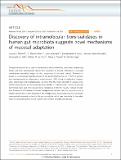Files in this item
Discovery of intramolecular trans-sialidases in human gut microbiota suggests novel mechanisms of mucosal adaptation
Item metadata
| dc.contributor.author | Tailford, Louise E. | |
| dc.contributor.author | Owen, C. David | |
| dc.contributor.author | Walshaw, John | |
| dc.contributor.author | Crost, Emmanuelle H. | |
| dc.contributor.author | Hardy-Goddard, Jemma | |
| dc.contributor.author | Le Gall, Gwenaelle | |
| dc.contributor.author | de Vos, Willem M. | |
| dc.contributor.author | Taylor, Garry L. | |
| dc.contributor.author | Juge, Nathalie | |
| dc.date.accessioned | 2015-08-21T15:40:01Z | |
| dc.date.available | 2015-08-21T15:40:01Z | |
| dc.date.issued | 2015-07-08 | |
| dc.identifier | 211299588 | |
| dc.identifier | 8ff6eeec-a1e9-4b4e-a597-245aa7cb7a70 | |
| dc.identifier | 000358857000017 | |
| dc.identifier | 84946936348 | |
| dc.identifier | 000358857000017 | |
| dc.identifier.citation | Tailford , L E , Owen , C D , Walshaw , J , Crost , E H , Hardy-Goddard , J , Le Gall , G , de Vos , W M , Taylor , G L & Juge , N 2015 , ' Discovery of intramolecular trans- sialidases in human gut microbiota suggests novel mechanisms of mucosal adaptation ' , Nature Communications , vol. 6 , 7624 . https://doi.org/10.1038/ncomms8624 | en |
| dc.identifier.issn | 2041-1723 | |
| dc.identifier.other | ORCID: /0000-0001-9486-566X/work/60428034 | |
| dc.identifier.uri | https://hdl.handle.net/10023/7310 | |
| dc.description | The authors acknowledge the support of the Biotechnology and Biological Sciences Research Council (BBSRC), this research was partly funded by the BBSRC Institute Strategic Programme for The Gut Health and Food Safety (BB/J004529/1) and by the BB/L008602/1 BBSRC-responsive mode grant. We also acknowledge support from the EU FP7 TORNADO programme. The research of WMdV was supported by the Academy of Finland, European Research Council and the Netherlands Organization for Scientific Research. | en |
| dc.description.abstract | The gastrointestinal mucus layer is colonized by a dense community of microbes catabolizing dietary and host carbohydrates during their expansion in the gut. Alterations in mucosal carbohydrate availability impact on the composition of microbial species. Ruminococcus gnavus is a commensal anaerobe present in the gastrointestinal tract of >90% of humans and overrepresented in inflammatory bowel diseases (IBD). Using a combination of genomics, enzymology and crystallography, we show that the mucin-degrader R. gnavus ATCC 29149 strain produces an intramolecular trans-sialidase (IT-sialidase) that cleaves off terminal α2-3-linked sialic acid from glycoproteins, releasing 2,7-anhydro-Neu5Ac instead of sialic acid. Evidence of IT-sialidases in human metagenomes indicates that this enzyme occurs in healthy subjects but is more prevalent in IBD metagenomes. Our results uncover a previously unrecognized enzymatic activity in the gut microbiota, which may contribute to the adaptation of intestinal bacteria to the mucosal environment in health and disease. | |
| dc.format.extent | 12 | |
| dc.format.extent | 1164051 | |
| dc.language.iso | eng | |
| dc.relation.ispartof | Nature Communications | en |
| dc.subject | Inflammatory bowel-diseases | en |
| dc.subject | Sialic-acid | en |
| dc.subject | Streptococcus-pneumoniae | en |
| dc.subject | Entric pathogens | en |
| dc.subject | Crystal-structure | en |
| dc.subject | Mucus layers | en |
| dc.subject | Mucin | en |
| dc.subject | Bacteria | en |
| dc.subject | Specificity | en |
| dc.subject | Metabolism | en |
| dc.subject | R Medicine | en |
| dc.subject | BDC | en |
| dc.subject | R2C | en |
| dc.subject | SDG 3 - Good Health and Well-being | en |
| dc.subject.lcc | R | en |
| dc.title | Discovery of intramolecular trans-sialidases in human gut microbiota suggests novel mechanisms of mucosal adaptation | en |
| dc.type | Journal article | en |
| dc.contributor.institution | University of St Andrews. School of Biology | en |
| dc.contributor.institution | University of St Andrews. Office of the Principal | en |
| dc.contributor.institution | University of St Andrews. Biomedical Sciences Research Complex | en |
| dc.identifier.doi | 10.1038/ncomms8624 | |
| dc.description.status | Peer reviewed | en |
This item appears in the following Collection(s)
Items in the St Andrews Research Repository are protected by copyright, with all rights reserved, unless otherwise indicated.

